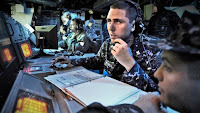
Disable enemy threats with communications technology Information Warfare
Discover threats and use vital communications to protect your country. Provide service members, planners and policy makers with real-time warnings, offensive opportunities and ongoing operational advantages. Work side-by-side with other Officers to make certain the right information is used at the right time, ensuring the success of the Fleet.
Job DescriptionAs an Information Warfare Officer, you will be directly involved in every aspect of Naval operations, deploying globally to support Navy and joint military requirements. You will deliver vital information to decision makers by attacking, defending and exploiting networks to capitalize on vulnerabilities in the information environment.
Specific Responsibilities
Your responsibility as a member of the information warfare community is to supply information superiority that successfully supports command objectives. This is achieved through the application of Information Operations (IO) and Signals Intelligence (SIGINT) expertise.
Other responsibilities of a Navy Information Warfare Officer typically include:
* Leading Information Operations personnel and advising Commanding Officers
* Coordinating information warfare measures in exercises and operations
* Assuming responsibility for processing real-time signal intelligence
* Conducting Computer Network Operations (CNO)
* Developing cutting-edge exploitation and defense systems
Work EnvironmentYour role as a Navy Information Warfare Officer will take you to sea, air and shore commands all across the globe. You may also have the chance to serve at the National Security Agency, the Pentagon or Regional Cryptologic Centers throughout the country. What’s more, you could have the opportunity to lead Cryptologic Technicians in related activities both afloat and ashore.
Training & Advancement
Prospective Navy Information Warfare Officers attend Officer Candidate School (OCS) in Newport, Rhode Island.
After completing OCS, you will attend the 11-week Navy Information Warfare Officer Basic Course in Pensacola, Florida, learning:
* Information Operations
* U.S. Cryptologic System
* Electromagnetic Theory
* RADAR
* Satellite Fundamentals
* Military Communications
* Signals Collection Operations
* Tactical Cryptology
* Collection Management
* Traffic Analysis
* Signals Intelligence Reporting
* National Security Strategy
* Computer Networks
* Introduction to Security
After graduation, your initial assignment will be at one of the four National Cryptologic Centers, where you’ll gain additional leadership and management experience:
* San Antonio, Texas
* Kunia, Hawaii
* Augusta, Georgia
* Fort Meade, Maryland
Education OpportunitiesVital communications demand highly educated Officers. These are some of your opportunities:
* Naval Postgraduate School in Monterey, California, allows the opportunity to earn an advanced degree. The school offers advanced degrees (master’s or doctoral) in many programs.
* The Junior Officer Career Cryptologic Program is a competitive three-year program that will broaden your education and experience and includes an intensive internship at the National Security Agency.
Pay RangeYou may earn better pay options for certain duties and proficiencies:
* Special sea pay
* Hazardous duty incentive pay
* Foreign language proficiency pay
QualificationsNavy Information Warfare Officers are required to have a four-year degree from a college or university.
After the NavyCareer Officers often enjoy increased responsibility and challenges that can include command, Fleet Commander Staff duty, major staff duty and duty as Information Warfare Commander. The specialized knowledge and expertise you gain as an Information Warfare Officer, coupled with your security clearance, may prepare you for future employment with the Central Intelligence Agency (CIA), Federal Bureau of Investigation (FBI) or National Security Agency (NSA) if you decide to return to the civilian sector when your service is finished.




































